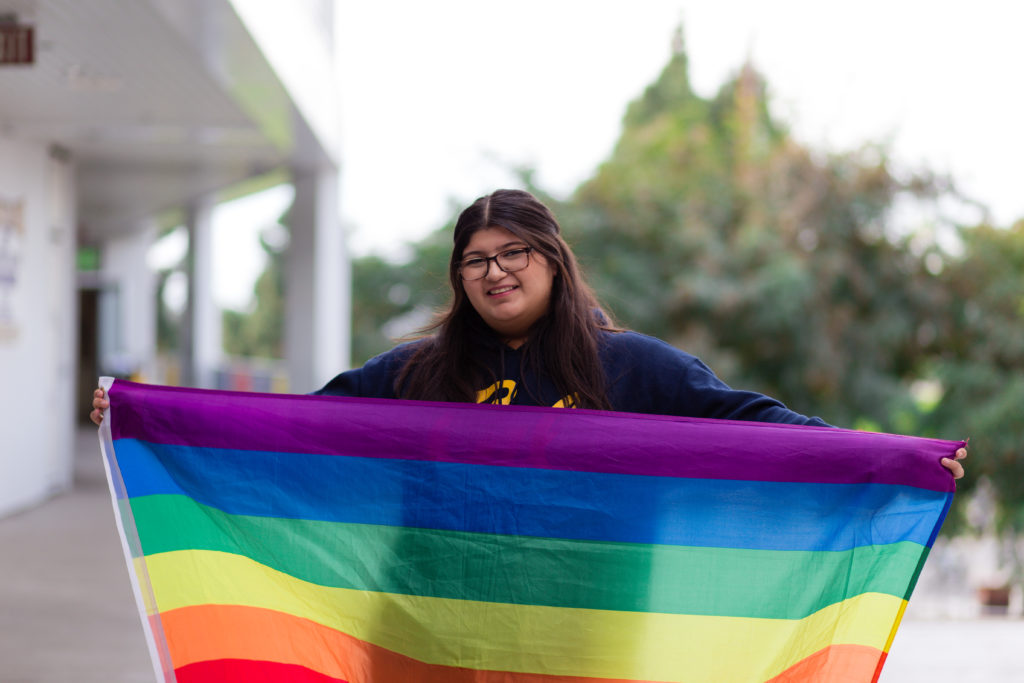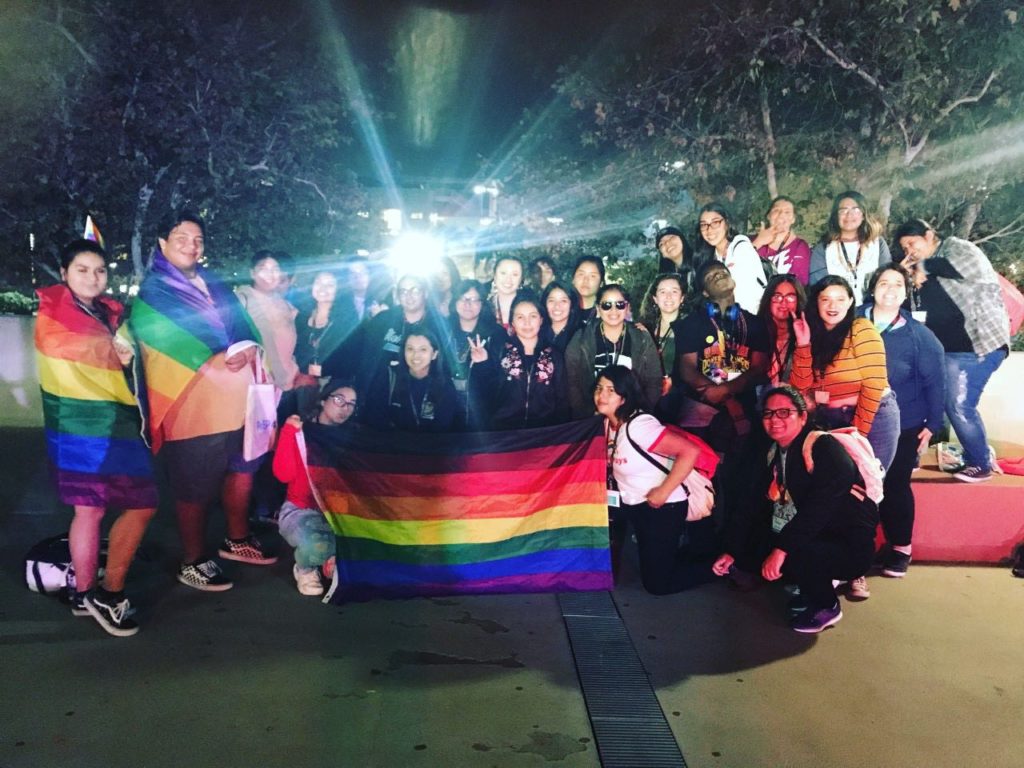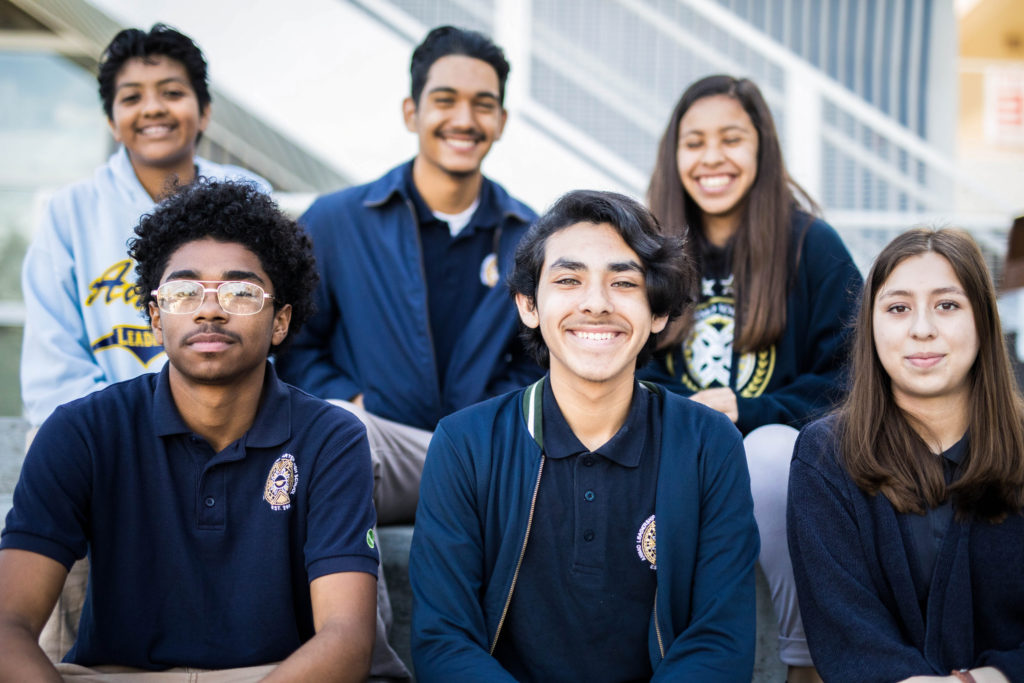How a Student Group Helped Promote a More Inclusive School Environment

“The reaction when you hear the word ‘gay’ on this campus is not the same as it once was. What was once pervasive is no longer,” recalled Sarah Ducker, English teacher at Ánimo Leadership Charter High School (LEA). Ducker credits this change to the students in Ánimo Leadership’s Stonewall Alliance, a student led group committed to cultivating a safe, open, and inclusive environment for all LGBTQ+ students and the ally community. Ducker supported students in the revival of the group after a brief hiatus with the goal of creating a safer, more inclusive campus. “At Leadership, the Stonewall Alliance has pushed us all to think more critically about our areas for growth in creating a more inclusive environment, including thinking about ways to provide gender neutral restrooms on campus” said Danielle Berger, Assistant Principal at Ánimo Leadership.
We’re in This Together
Marissa Villegas, Stonewall Alliance president and Ánimo Leadership junior, joined the group her freshman year in hopes of influencing culture at her school. “Schools should acknowledge the LGBTQ+ community so all LGBTQ+ students within the school know that teachers and staff support them,” said Villegas. “Doing so shows students that they aren’t alone.”

In schools with no Gay-Straight Alliance (GSA) club or alternative safe spaces, LGBTQ+ students can feel isolated from their peers in a place they spend the majority of their time. Students battling with feelings of isolation and rejection are more likely to suffer emotionally, socially, and academically. A 2017 survey from the Human Rights Campaign found that over 40% of LGBTQ+ youth say the community in which they live is not accepting of LGBTQ+ people. In addition, the results of a 2015 GLSN National School Climate Survey show that LGBTQ students who have experienced higher levels of harassment were 60% more likely to have missed school in the past month and have lower GPAs than those who were infrequently harassed.
“We know there are a lot of places in students’ lives where it’s not safe to be out emotionally or physically, so having at least an hour a week where they feel safe was important, even though we knew that isn’t enough,” said Ducker. Armando Rico, a sophomore at Ánimo Leadership, transferred from a high school that lacked a GSA and alternative safe spaces. He recalls bullying being a big issue along with a lack of awareness and supports for students who identify as LGBTQ+. “At my other school there was a lot of negativity, but a group like this would’ve helped uplift students and given LGBTQ+ students a safe space,” said Rico. At Ánimo Leadership Rico has made many friends and found a safe space to be himself. Joining the Stonewall Alliance has provided Rico with support and inspired him to come out to his parents. “It’s so freeing, I feel like I’m finally able to be myself.”
The Importance of Introduction and Reintroduction
At the start of each Stonewall Alliance meeting, everyone introduces themselves using their name and preferred gender pronouns. For example, ‘you,’ ‘they,’ and ‘I’ are considered gender neutral pronouns whereas ‘she,’ ‘her’ or ‘he’ are considered gendered pronouns. Using the pronoun or set of pronouns that an individual would like others to use when talking to or about them positively impacts an individual's self-worth and sense of strength in their identity. Misgendering occurs when someone uses language that doesn't align with a person’s affirmed gender.
At the beginning of the school year, a student asked the group, “Why do we introduce ourselves every meeting when we already know each other?” Ducker responded: “The intention is to give everyone the space to try a different pronoun if they choose, instead of assuming what someone feels one day is how they’ll feel six months later.” Ducker explains that many people don’t realize that it is in fact a privilege to not be filled with uneasiness because you don’t know which pronoun someone is going to use based on how they discern your gender. The meeting’s opening ritual reinforces that a student’s gender identity is valid and respected.
As a result of the safe space created within Stonewall, students feel empowered to educate their peers and promote inclusive speech by having regular conversations on LGBTQ+ issues and addressing offensive speech and jokes. “Students then started doing outreach to teachers, focusing on specific topics like how teachers can show allyship, and various ways adults on campus can intervene if someone says something offensive,” said Ducker.
To address myths and misconceptions, and to normalize conversations surrounding the experience of the LGBTQ+ community, the group hosts events on campus and regularly submits LGBTQ+ facts and heroes to the school’s daily announcements. Their efforts have catalyzed dialogue, grown club membership, and expanded allies. “At first people thought that you had to be a part of the LGBTQ+ community to join the Stonewall Alliance, but eventually people realized they could just be an ally and come to support other students,” said Villegas.
"At Leadership, Stonewall has pushed us to think more critically about our areas for growth in creating a more inclusive environment, including thinking about ways to provide gender neutral restrooms on campus,”
--Danielle Berger, Assistant Principal at Ánimo Leadership.
Teachers and students alike have benefited from this open dialogue; it’s allowed teachers to better understand how to meet students’ needs, and it’s helped students feel heard, and created an opportunity for advocacy.
Safe Spaces for All

Our schools have always served as safe spaces for students grappling with a multitude of external circumstances, and when it comes to supporting and serving LGBTQ+ youth, there is no exception. If we truly want our students to reach their full potential, we must create a positive school experience for all. In our annual California Healthy Kids Survey (CHKS), organizational leaders were surprised to find how often LGBTQ+ students felt negatively as a result of exclusion.
As a result, Green Dot California has begun an exploration of what organization-wide practices we can implement to support our LGBTQ+ community. As a starting point, we’ve provided school all leaders in California with professional development on the context and language of gender identity and sexual orientation and supporting LGBTQ+ students. Our schools are committed to building safe and inclusive environments where all truly means all.
